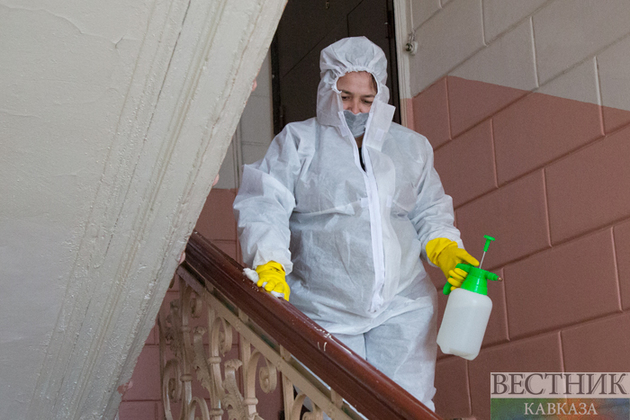Belarus remains the only country in Europe and one of the few in the world where nothing is officially done to stop or slow down the spread of COVID-19. According to official figures, nothing special is happening in the country. Rumors, even divided in half, scare. However, official data give every reason to assume that in Belarus with coronavirus not everything is so serene.
As of April 29, the country has more than 13 thousand cases of infection. And only in the last day almost a thousand people fell ill. It is officially recognized that 84 people died. With symptoms of coronavirus. But the Ministry of Health constantly emphasizes that all the dead suffered from serious illnesses — some of them heart, some lungs, some kidneys, etc.
The head of the department, Vladimir Karanik, in a conversation about his department admitted the infection of about 400 doctors and hospital workers. According to various data, "walking" on the network, eight health workers died. Despite the fact that they work under certain pressure, the Belarusian media publish photos from Belarusian cemeteries with many fresh graves. The images are accompanied by stories of relatives of the deceased - all as one, citing medical reports, they call the cause of death anything but COVID-19.
Opposition-minded media report that if the situation in Minsk is more or less satisfactory, then in smaller cities and district centers, hospitals cannot cope with the influx of patients. Moreover, the vast majority of patients, especially those with mild symptoms, simply do not test for coronavirus.
Obviously, such publications, if the Belarusian authorities were not impressed, still attracted the attention of international institutions. The UN and the European Union called on President of the country Alexander Lukashenko to change his mind and reconsider the attitude to the epidemic raging all over the planet, which daily kills thousands of people. The recommended measures are very modest: at least to cancel mass events, obviously implying the celebration of May 9, which Belarus is actively preparing for, and demand from the population that they maintain a social distance of one and a half to two meters.
A corresponding video message to the authorities of Belarus was made by the UN permanent coordinator in this country, John Kazan-Vishnevetskaya. She noted that the number of infected COVID-19 in Belarus "is growing exponentially." Kazan-Vishneveka emphasized that the delegation of the World Health Organization (WHO), by the way, who had visited the country at the invitation of Lukashenko himself, warned that mass events should be canceled. "In addition, WHO recommended organizing distance work and distance learning in schools and universities, to suspend the work of enterprises, which can somehow be avoided during the pandemic - cafes, restaurants, shopping centers," said Ioanna Kazan-Vishnevetskaya.
Meanwhile, observers note that President Lukashenko has not appeared in public for two days and does not say that coronavirus is an ordinary flu, and that you need to work in the field, grow vegetables and fruits, play hockey, because ice doesn’t viruses, or at worst, after working in the field, drink vodka, as the ancestors were treated. From the fact that the president is not visible, no conclusions should be drawn, even taking into account the fact that he defiantly visited crowded places, for example, the church. Lukashenko has such a habit of taking such “timeouts”.
With all this, it is worth paying attention to the fact that the president’s consistent denial of the epidemic is periodically violated by other statements. So the other day, he casually admitted the introduction of not just a state of emergency, but even curfew. He made it clear that we need to consider the issue of increasing salaries. He himself, as they said, invited a WHO delegation to Belarus to assess the situation with COVID-19. And although after the guests he released unflattering reviews, apparently disappointed that they saw a different situation than he did, but in fact he shared his responsibility with WHO. In addition, it cannot be said that in Belarus everything is so left to chance. In cities, every now and then you can stumble upon recommendations to wash your hands more often, on announcements that public transport or shops are periodically disinfected, on reminders of the need to maintain a social distance, etc. etc.
That is, in fact, the existence of a problem is recognized by the authorities. But officially no. Why? The answer seems simple. With the official recognition of the epidemic, one will have to act like in other countries: stop enterprises with at least partial salaries, subscribe to help small and medium-sized businesses. By his actions, Lukashenko relieves himself of responsibility for the fate of the Belarusian business. What he actually spoke about more than once directly, urging entrepreneurs to save their enterprises and businesses themselves in an open text, not hoping for the state. The economy, meanwhile, was on the decline due to the "oil war" with Russia. No money. Also, the elections on the nose - the presidential in late August.
Lukashenko will go to the sixth presidential term against an unimportant background. After the pandemic, the state will be in what state no one will predict. So he does not have this trump card. If the epidemiological situation normalizes for the elections, then, with appropriate signs, the Belarusian leader will change the emphasis in the statements and then announce victory over the coronavirus. His competitors, as usual, will be conditional. But the population needs to promise something, something needs to be presented. Alexander Lukashenko understands perfectly well that one cannot do without it and cannot be ensured only by tightening the screws. Therefore, it is an outstanding political long-liver of the post-Soviet space.






